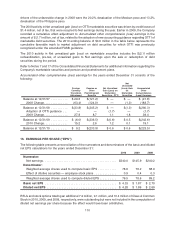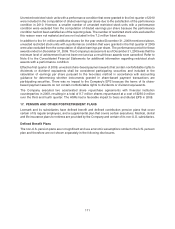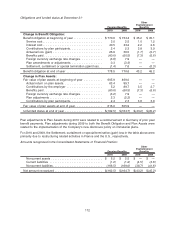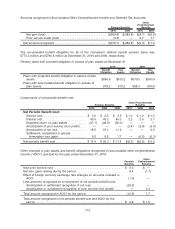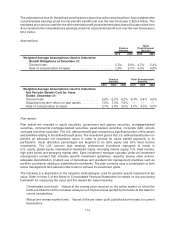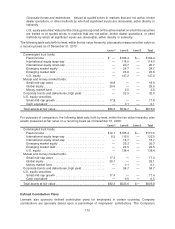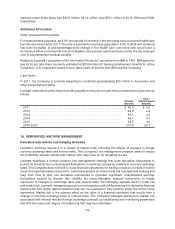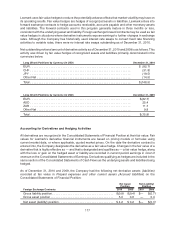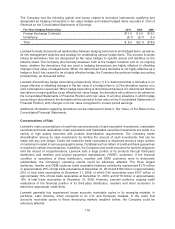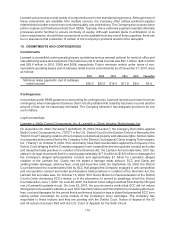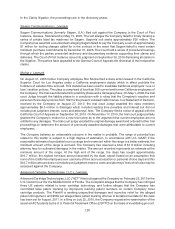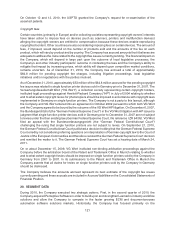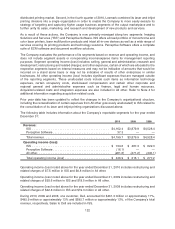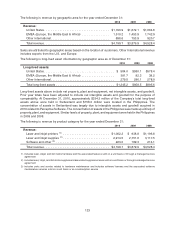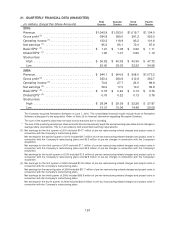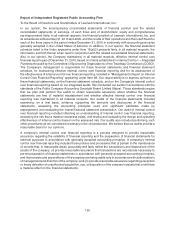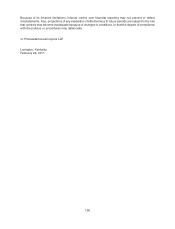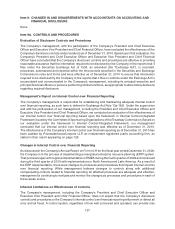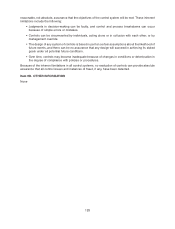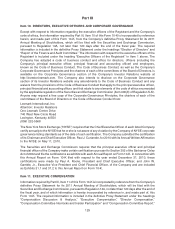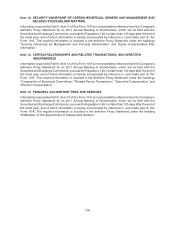Lexmark 2010 Annual Report Download - page 126
Download and view the complete annual report
Please find page 126 of the 2010 Lexmark annual report below. You can navigate through the pages in the report by either clicking on the pages listed below, or by using the keyword search tool below to find specific information within the annual report.
In the Clarity litigation, the proceedings are in the discovery phase.
Sagem Communications v. Lexmark
Sagem Communications (formerly Sagem, S.A.) filed suit against the Company, in the Court of First
Instance, Geneva, Switzerland on May 15, 2007. The suit alleges the Company failed to timely develop a
series of private label fax machines for Sagem. Sagem’s suit seeks approximately $30 million. The
Company has asserted a counterclaim alleging Sagem failed to pay the Company a sum of approximately
$1 million for tooling charges called for in the contract in the event that Sagem failed to meet certain
minimum purchase commitments by December 31, 2005. The Court held a series of procedural hearings
through which the parties presented testimony and documentary evidence supporting their claims and
defenses. The Court of First Instance issued its judgment on September 30, 2010 dismissing all claims in
the litigation. The parties have appealed to the Geneva Court of Appeals the dismissal of their respective
claims.
Molina v. Lexmark
On August 31, 2005 former Company employee Ron Molina filed a class action lawsuit in the California
Superior Court for Los Angeles under a California employment statute which in effect prohibits the
forfeiture of vacation time accrued. This statute has been used to invalidate California employers’ “use or
lose” vacation policies. The class is comprised of less than 200 current and former California employees of
the Company. The trial was bifurcated into a liability phase and a damages phase. On May 1, 2009, the trial
court Judge brought the liability phase to a conclusion with a ruling that the Company’s vacation and
personal choice day’s policies from 1991 to the present violated California law. In a Statement of Decision,
received by the Company on August 27, 2010, the trial court Judge awarded the class members
approximately $8.3 million in damages which included waiting time penalties and interest but did not
include post judgment interest, costs and attorneys’ fees. The Company filed a notice of appeal with the
California Court of Appeals on September 30, 2010. On November 17, 2010, the trial court judge partially
granted the Company’s motion for a new trial solely as to the argument that current employees are not
entitled to any damages. The trial court judge vacated the original damage award and ordered further trial
proceedings to determine the amount of previously-awarded damages that were attributable to current
employees.
The Company believes an unfavorable outcome in the matter is probable. The range of potential loss
related to this matter is subject to a high degree of estimation. In accordance with U.S. GAAP, if the
reasonable estimate of a probable loss is a range and no amount within the range is a better estimate, the
minimum amount of the range is accrued. The Company has reserved a total of $1.8 million including
attorney fees for estimated damages in the matter. The amount recorded represents an estimate at the
minimum amount of the range. At the high end of the range, the class has sought approximately
$16.7 million, the highest forfeiture amount asserted by the class’ expert based on an assumption that
none of the California employees ever used any of their accrued vacation or personal choice days and this
$16.7 million amount does not include post judgment interest, costs and attorneys’ fees which also may be
assessed against the Company.
Advanced Cartridge Technologies, LLC v. Lexmark
Advanced Cartridge Technologies, LLC (“ACT”) filed suit against the Company on February 22, 2010 in the
U.S. District Court for the Middle District of Florida. The Complaint alleges that the Company has infringed
three US patents related to toner cartridge technology, and further alleges that the Company has
committed false patent marking by improperly marking patent numbers on certain Company toner
cartridge products. The Plaintiff is seeking unspecified damages and injunctive relief for the alleged
patent infringement, and $500 per alleged false patent marking offense. A tentative trial date for the case
has been set for August, 2011. In a filing on July 22, 2010, the Company requested re-examination of the
asserted ACT patents by the U.S. Patent & Trademark Office (USPTO) on the basis of invalidating prior art.
120


